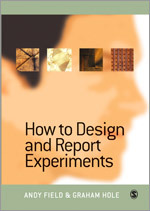How to Design and Report Experiments
- Andy Field - University of Sussex, UK
- Graham Hole - University of Sussex, UK
Research Methods in Psychology
While many books look at the fundamentals of doing successful experiments and include good coverage of statistical techniques, this book very importantly considers the process in chronological order with specific attention given to effective design in the context of likely methods needed and expected results. Without full assessment of these aspects, the experience and results may not end up being as positive as one might have hoped. Ample coverage is then also provided of statistical data analysis, a hazardous journey in itself, and the reporting of findings, with numerous examples and helpful tips of common downfalls throughout.
Combining light humour, empathy with solid practical guidance to ensure a positive experience overall, How to Design and Report Experiments will be essential reading for students in psychology and those in cognate disciplines with an experimental focus or content in research methods courses.
The book has been listed as an essential text for PSYC 2999 course.
This is a clear and useful textbook to supplement guidlines given in class for reporting experiments.
This book is a must for any one doing experimental research
This is a great book- very clear and also funny
A great book for all those interested in Experimental Design. Gives the essentials on how to develop experimental studies.
Recommended to students and has been added to the module reading list. Very useful for different aspects of experimental design but also help with report writing in APA format.
Extremely useful book.
Great supplemental book on experimental methodology. It was quite thorough for how we set up our course. But that is something that could change in the near future. We are considering a follow up course on how to design experiments in HCI. This would be great book for that purpose.
I have recommended this book to students at UG and MSc level in their write up of lab reports and their disserations. I find the layout of the book and chapters to be appealing and logical. The tone of language is engaging and certainly one that the students identify with. This has meant that those who use it, find it invaluable.
This book is a great all-rounder for an undergraduate introductory research methods & statistics course. Written in an accessible style, this is a great choice for cash-strapped students.







